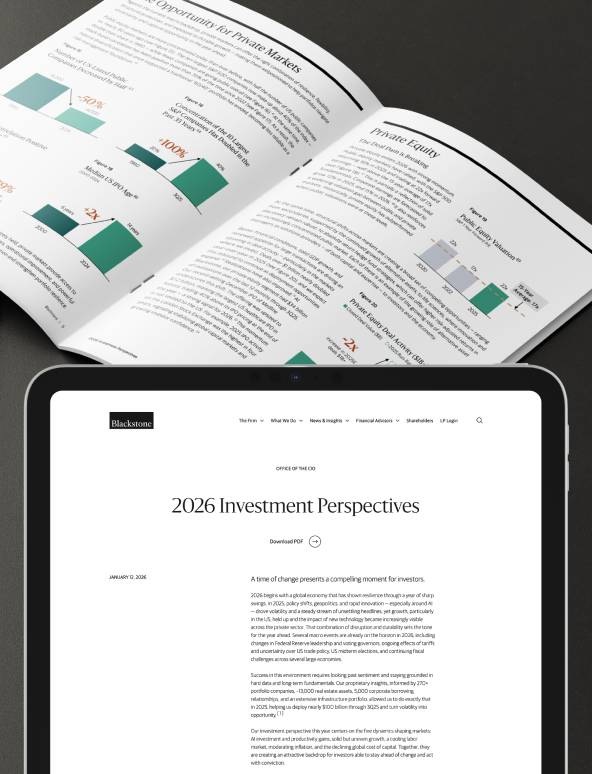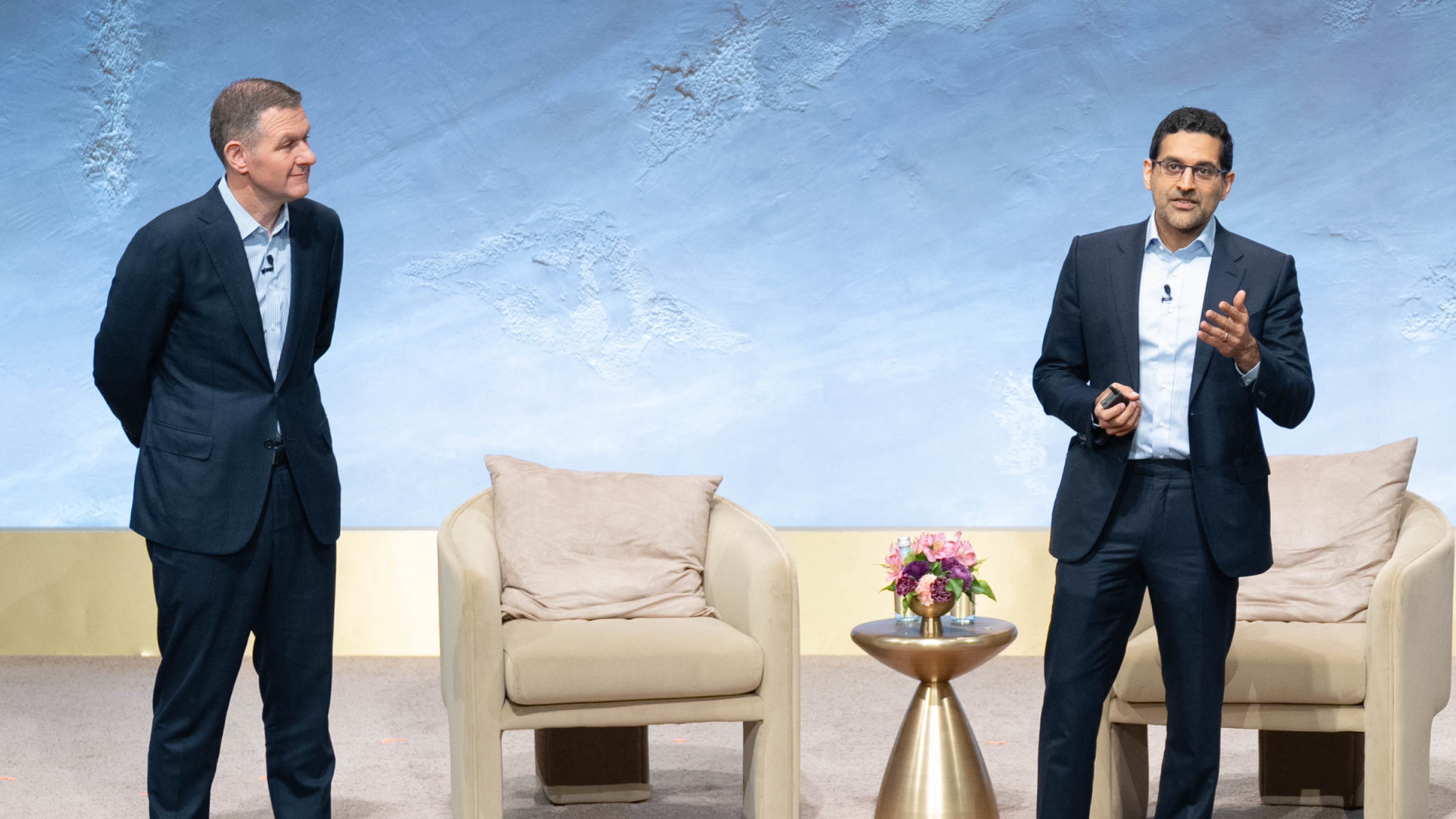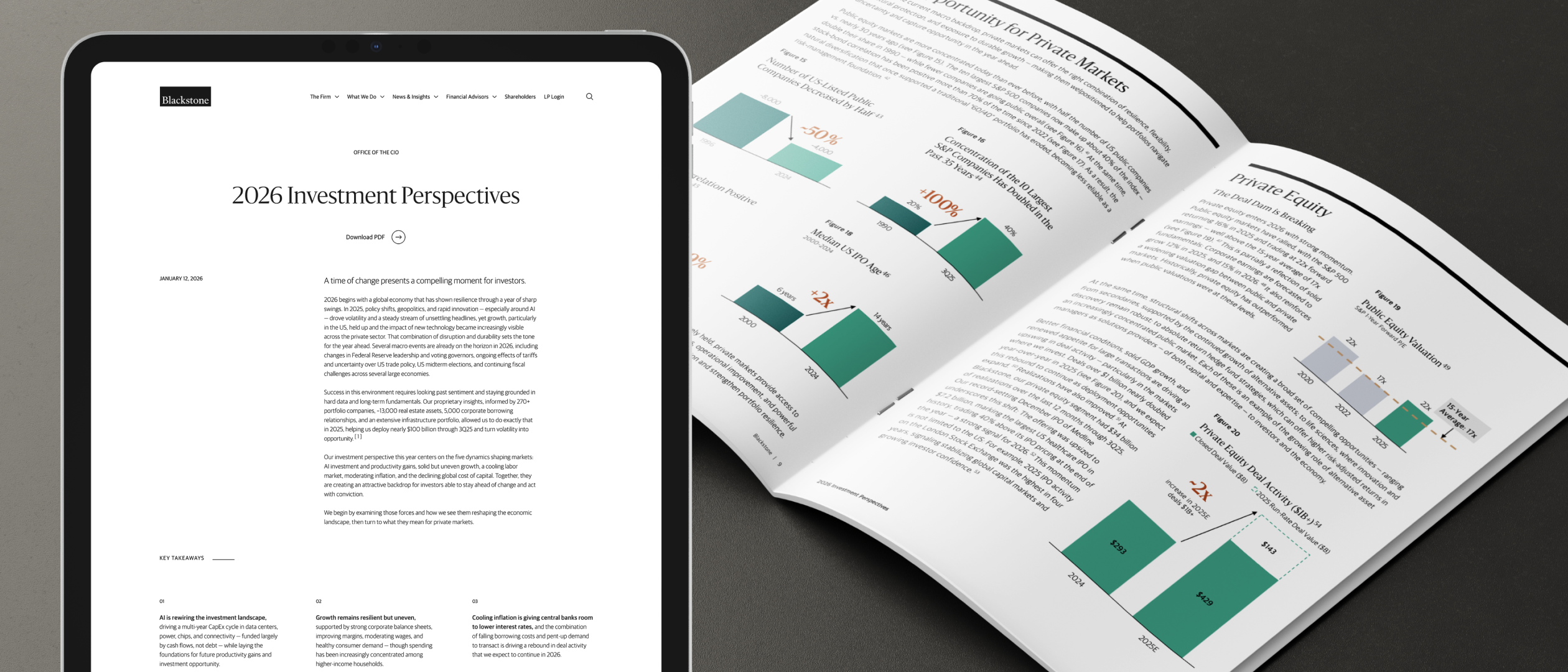We sat down with Amit Dixit, Head of Asia for Private Equity, and Tuhin Parikh, Head of India for Real Estate, to take a closer look at Blackstone’s conviction in the country.
Blackstone has been operating in India for 16 years and we’re now one of the leading investors here. What’s been the key to our success?
AD: Three things differentiate us in India: our scale, our active approach to building businesses and our partnerships with managers and fellow shareholders.
First off, investment firms in India generally have either a private equity business or a real estate business, but they rarely have both and they rarely have both at scale, like we do. This enables us to leverage macro-trends in an integrated way.
Secondly, we are active investors who are passionate about building and shaping our companies. It’s in our DNA to be business builders — Blackstone only buys what we can build; we’re always looking for opportunities to make companies better. Even before we make an investment, we have a plan for how to build the business, so that what we buy is not what we sell. That’s a big part of what makes something a “Blackstone deal.”
Finally, we’ve developed strong partnerships with our portfolio companies’ management teams and other shareholders. Getting cohesive management and shareholder alignment isn’t always easy, but it’s something we’ve prioritized from the beginning.
“Three things differentiate us in India: our scale, our active approach to building businesses and our partnerships with managers and fellow shareholders.”
Amit Dixit, Head of Asia for Blackstone Private Equity
TP: From the real estate point of view, a huge component of our success has been our emphasis on tenant engagement — amenities and services like cafes, gardens and community-building activities. Prior to our arrival, tenant engagement wasn’t part of a landlord’s job description. We’ve changed that; requests for proposals for most bids incorporate it. In this sense, we’ve gone beyond transforming individual assets and businesses — we’ve helped transform the entire real estate industry.
How have you seen the investing and overall business landscape in India change over the years?
AD: There’s been a big transformation. India used to be and still is largely a market for minority investing, especially in private equity. Our business-building approach led us to pioneer control-oriented investing that gives us large, active stakes in businesses.
Other changes include the size of the deals and the exits. When we first started, a $50-million transaction was a big deal. Now, we’re routinely seeing billion-dollar-plus transactions. Similarly, exits used to be rare when we started, and typically came in the form of IPOs. Over the years, the market has matured. We’re now seeing secondary sales, dividend recaps and strategic sales in addition to IPOs.
TP: I would add that the Indian government has introduced several initiatives that have benefited the real estate industry. The Goods and Services Tax (GST), introduced in 2017, simplified the home-buying process with a uniform indirect tax for the entire country, transforming India into a common market. The National Infrastructure Pipeline, an infrastructure investment initiative designed to drive national economic growth, will invest $1.8 trillion across more than 9,300 infrastructure development projects.
Most significantly for us, the Securities and Exchange Board of India (SEBI) coordinated closely with private investors to introduce REITs into the public market, establishing a new source of long-term capital that didn’t previously exist in the real estate sector. There are only three REITs listed in India, and Blackstone launched two of them: Embassy Office Parks in 2019 and Mindspace REIT in 2020.
We’ve built a sizeable portfolio that includes various types of real estate, a range of private equity portfolio companies and even a growth equity investment. What is the common thread across these assets, and what do we look for when considering a new investment?
AD: It’s the same thread that unites all Blackstone investments: our thematic approach. We act in an integrated, global fashion, investing in the industries benefiting from changes in the way people are living, shopping, working and spending their leisure time — “good neighborhoods,” we often call them.
To give you an example: a huge theme for the firm has been digital transformation, and it’s at the core of our success in India. Indian engineers are building the information technology, services and software used by companies all over the world. On the private equity side, we invest in the businesses employing these engineers — companies like Mphasis, an information technology services provider that specializes in cloud and digital solutions, or Aakash Education Services, a recent exit that we helped transform from a physical test-prep education company into an edtech company.
Hear from Nitin Rakesh, CEO of Mphasis.
It’s an incredible flywheel effect, helping our portfolio companies build a strong network through Blackstone. For example, 15 of our portfolio companies have become customers of Mphasis.
TP: The same themes inform our investments on the Real Estate side. While the Private Equity team backs the companies where Indian engineering talent works, we buy the office space that houses this talent. About half of our office portfolio is leased to tech companies. Our Embassy REIT portfolio, for instance, includes Embassy TechVillage — an office park in Bengaluru that leases office space to global tech companies like Cisco and Sony.
The digital transformation theme drove our investments in logistics and data centers as well. The explosion of e-commerce fueled demand for logistics assets, which in turn prompted us to launch Horizon — India’s second-largest logistics portfolio, comprised of 16 Grade-A logistics and warehousing assets. It also fueled demand for data centers; they’re the backbone of the internet and the infrastructure that enables all these engineers to do their work.
You spoke earlier about building businesses, not just owning them. What does that mean in practice?
AD: What has united several of our biggest successes in recent years is the fact that the companies we bought were different from the companies we exited or IPOed. Sona Comstar, for example, started as a combustion engine company but now supplies a component part to one in eight electric vehicle (EV) differential assemblies sold globally, making it India’s largest electric vehicle company.
Infusing technology into all our businesses is a big part of helping companies grow and scale. Technology is not a vertical; it’s a horizontal — it can transform every company. When you get technological transformation right, you get two big benefits: very strong revenue growth because the business is levered to the trends of the future — what we call “future-proofing.”
TP: Future-proofing is essential to what we do on the real estate side. Over two-thirds of India’s population is younger than 35, and we intentionally built one of the largest and most diversified retail platforms in India — including 17 Grade-A malls — to meet the needs of this demographic group. Several of these malls connected retail shoppers in non-metro areas with international brands like H&M and Miniso.
What role does ESG play in Blackstone’s investments in India?
AD: At Blackstone, we focus our ESG efforts on decarbonization, diversity and good governance because we believe that these priorities make our portfolio companies stronger and more resilient and drives value.
For example, Essel Propack, which reduces plastic consumption by developing fully recyclable packaging tubes, committed to a 25% energy reduction target during our ownership, and Piramal Glass, a specialty glass packaging player, achieved a 6.5% emissions reduction in just a year. On the governance front, we use our huge network to put leading talent on our companies’ boards — including professionals from Unilever, AIG, IBM and GM.
TP: Our Charitable Foundation also accelerates these priorities in a philanthropic context, promoting resilience in the communities in which our companies operate. In the spring of 2021, the Foundation expanded COVID-19 healthcare services to underserved communities, providing ventilators and other essential supplies, with a $5 million donation.
More recently, two of our associates won $100,000 for the Indian Development Foundation’s Bal Gurukul project, which provides after-school education programs to children most in need, through the Blackstone Gives Back Challenge. This annual initiative awards grants to charitable organizations nominated by employees across the firm.
What excites you about our future in India?
TP: So many things — but I’ll focus here on opportunities to support local and regional economic development. I think, for instance, of our partnership with local authorities in Mumbai for the One Green Mile project, one of the first public-private partnerships in urban infrastructure. The project redeveloped a one-mile stretch of road so it included pedestrian pathways and cycling tracks, as well as a community space that features a library, amphitheater and 100 trees. The regional minister of tourism and environment praised One Green Mile as a model for future public-private collaborations. We’re keen for more of these kinds of collaborations that equip India’s communities to thrive and grow.
AD: That’s the most exciting thing for me — that growth. It’s incredibly energizing to see all the secular tailwinds we’ve been talking about come together. India’s young, ambitious population has so much to offer the world, and we’re ready to continue playing a part in unleashing their innovation and creativity.

Vision, Ambition, and Humanity in the Age of AI: Insights from Blackstone’s CEO Conference
December 23, 2025



